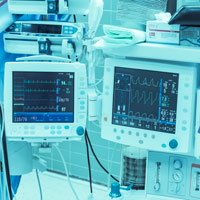Alarm Fatigue Among Healthcare Providers Jeopardizes Patient Safety
February 21, 2019 When a patient is admitted to the hospital, oftentimes, they are hooked up to a range of machines that monitor heart rate, oxygen levels, and other important vital signs. Many of the medical devices used to monitor a patient’s health are equipped with alarms that will alert the healthcare provider if something is wrong. While these alarms are designed to save lives, a recent report found that most alerts are false alarms. As a result, healthcare providers may be less likely to respond. This can jeopardize the health and safety of patients who need immediate care.
When a patient is admitted to the hospital, oftentimes, they are hooked up to a range of machines that monitor heart rate, oxygen levels, and other important vital signs. Many of the medical devices used to monitor a patient’s health are equipped with alarms that will alert the healthcare provider if something is wrong. While these alarms are designed to save lives, a recent report found that most alerts are false alarms. As a result, healthcare providers may be less likely to respond. This can jeopardize the health and safety of patients who need immediate care.
According to the report conducted by the US Emergency Care Research Institute, there are hundreds of clinical device alarms going off on any given day. There is no standard alarm sound, so the noises coming from different devices can be overwhelming to healthcare workers. Over time, they can become desensitized to the alarms and experience alarm fatigue. When different medical machines sound alarms so frequently, healthcare workers may have difficulty distinguishing between the different alarms going off. In some cases, they simply ignore the alarm after dealing with so many false or nuisance alarms.
Too Many Alarms Ignored by Healthcare Professionals
In Johns Hopkins Hospital alone, there were 350 alerts per bed, per day over a 12-day period. There was an average of 771 alerts per bed, per day in one of the intensive care units. While thousands of alarms go off throughout the day at an average hospital, up to 90 percent of the alerts are false alarms, and do not require immediate medical intervention. This creates a potentially dangerous situation. Johns Hopkins has tweaked some of the settings on their devices, which has resulted in a 24 to 74 percent reduction in the number of alarms that go off each day.
In 2017, the Joint Commission released the Hospital National Patient Safety Goal, which hospitals are required to take seriously if they want to keep their accreditation. To better manage clinical alarm systems, hospitals are urged to do the following:
- Make alarm system safety a priority by creating new policies and procedures, and train staff on how to manage the alarms.
- Identify the alarm signals that are most important, and the risk to the patient if it is ignored.
- Create new policies and procedures for effectively managing alarm signals, including appropriate settings, and when it is acceptable for alarms to be disabled.
- Educate hospital staff about clinical alarm systems.
Baltimore Medical Malpractice Lawyers at LeViness, Tolzman & Hamilton Advocate for Victims of Medical Negligence
If your health and safety has been compromised because a healthcare provider failed to provide immediate medical attention when your alarm went off, do not hesitate to contact the Baltimore medical malpractice lawyers at LeViness, Tolzman & Hamilton. We will conduct a thorough investigation into your case and determine who is responsible for your injury. Protecting your legal rights is our top priority and we will not stop fighting for you until we have your complete satisfaction. Our dedicated team will secure the maximum financial compensation you deserve. To schedule a free, confidential consultation, call us today at 800-547-4LAW (4529) or contact us online.
Our offices are located in Baltimore, Columbia, Glen Burnie, and Towson, allowing us to represent medical malpractice victims in Maryland, including those in Anne Arundel County, Baltimore County, Carroll County, Harford County, Howard County, Montgomery County, Maryland’s Western Counties, Prince George’s County, Queen Anne’s County, Southern Maryland, and the Eastern Shore, as well as the communities of Catonsville, Essex, Halethorpe, Middle River, Rosedale, Gwynn Oak, Brooklandville, Dundalk, Pikesville, Nottingham, Windsor Mill, Lutherville, Timonium, Sparrows Point, Ridgewood, and Elkridge.






